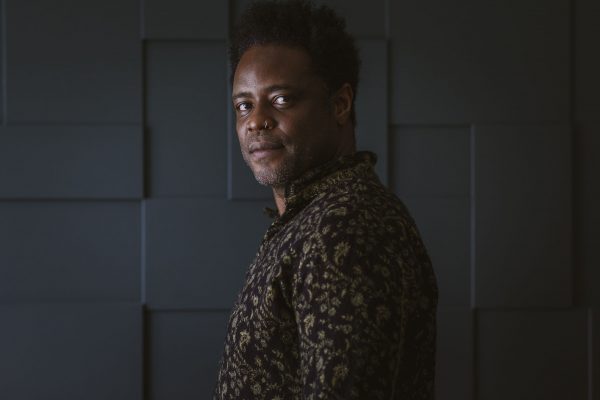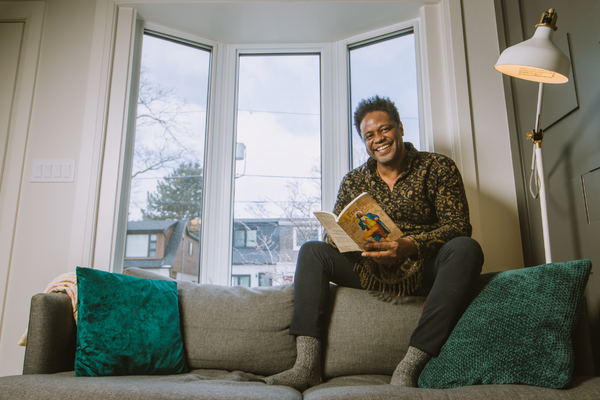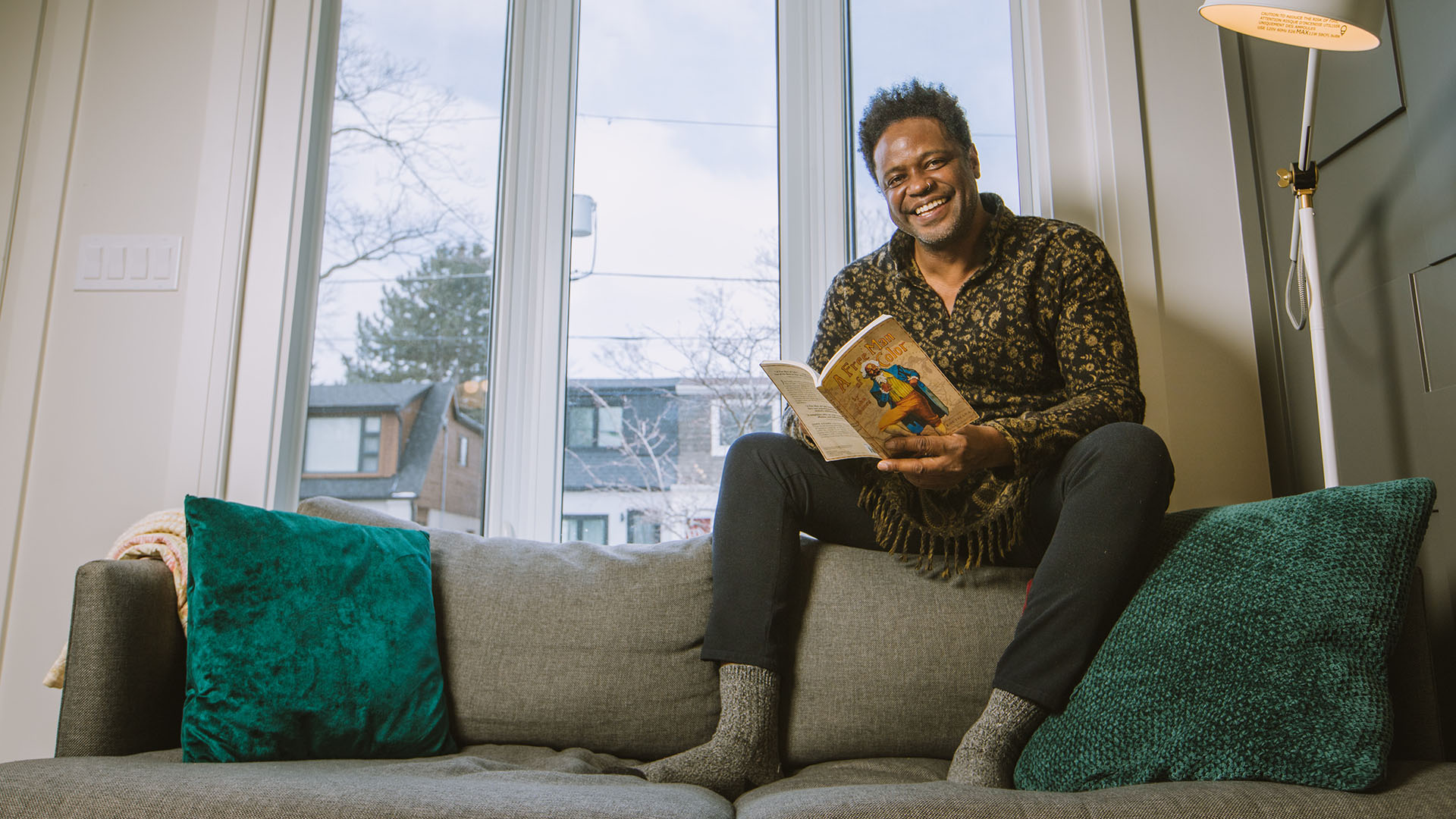Filmmaker Charles Officer has travelled the world, but his devotion to telling Toronto’s untold stories, and his dedication to community, proves there’s no place like home. When we interviewed him, Charles Officer’s home offered a…
By NowPlayingToronto
When we interviewed him, Charles Officer’s home offered a glimpse into a life in transition. From its pristine new car-like smell and unpacked boxes tucked away into corners to minor personal touches, it revealed some important details about its owner. The newness? Explained by the fact that it had only been a little while since Charles found himself back in Toronto — in a new house, with a then newborn. The boxes and small personal touches? The writer-actor-director was busy. When it was released, Charles’s most ambitious project, drama series The Porter, premiered on CBC then made its way to BET+ before being nominated for an Emmy for Outstanding Choreography For Scripted Programming. It may have been easy to compare Charles’s new work to the first-time father having another baby. But unlike fatherhood, The Porter isn’t Charles’s first time at the filmmaking rodeo.
For over two decades, the founder of Canesguar Filmworks has written and directed numerous shorts, features, and documentaries — many of which have been Toronto International Festival (TIFF) selections. In fact, Charles’s directorial debut, When Morning Comes, premiered at the 2000 TIFF. Charles’ second film, Short Hymn_Silent War received a Special Jury Citation at TIFF 2002. His feature film Nurse.Fighter.Boy. made its debut at TIFF in 2008, and he followed it with another TIFF entry, 100 Musicians, in 2012. Charles returned to TIFF in 2018, when his feature documentary Unarmed Verses earned him a TIFF Top Ten People’s Choice Award. And, in 2020, 25 years after TIFF’s Black cinema showcase (Planet Africa) began, it included Charles’ crime drama Akilla’s Escape.

This interview has been edited for length and clarity.
Meghan Yuri Young: Charles, the concept of identity seems to be at the centre of everything you do. That and storytelling. When did you know that telling stories — giving space for certain narratives — was something you were meant to do?
Charles Officer: I think your first experience really affects how you move forward. When I was younger, I felt I had one specific story I was emotionally connected to, that I had to tell. And I wrote it, but I didn’t plan on directing it. I was going to live it. I was going to actually play my father — an incarnation, a spirit, an idea of him that I knew. But my mentor, [acting teacher and theatre director] Jacqueline McClintock said to me, “You’re the only one who can tell this story.” I didn’t even know what that meant at that moment. So, I was still looking for other directors.
MYY: But by writing it and acting in it, you were telling this story. What more could you do to tell that story, within what you knew?
CO: Exactly. You only know what you know. And I never directed or made a film before, so I was like, “How would I do this?” She literally said, “You know, you’ll figure it out.” And, you know what, I did .
That film — it was called When Morning Comes — was very emotionally heavy. It’s the first film I made that got into the Toronto International Film Festival. I didn’t really know the intention of making that film. I thought I was gonna make it and then see if I liked it, maybe move on or not. But you’re suddenly thrust in this place of showing it and taking in the response.
Actually, my mom came to the screening. I saw her looking at me, making the connection about who I was talking about. I felt in that moment, this was for me because there was something emotional that happened in that theatre. The audience had no idea about my personal connection to the story I’m telling, but somehow they felt something. I communicated without actually having had to talk, which was very unique.
MYY: Cathartic.
CO: Cathartic. Everything I make is cathartic.
MYY: At what point did you trust yourself? Here’s Jacqueline, she trusts you, she knows you can tell your story, but you’re interviewing directors still. When did you decide to bet on yourself?
CO: To answer that, I have to tell you about how Jacqueline ended up writing me a letter to go to the Neighborhood Playhouse School of the Theater in New York. I was the only Black student in an international theatre school. I didn’t identify with the scenes I was getting. I kept asking myself, “How can I identify with this? And not because some Hollywood guy did this.”
So, I wrote my first script. And I found myself interviewing a third director, who basically blew it up from seven pages to 30 and then told me I needed $600,000 to make this film. Meanwhile, I had gotten a $5,000 grant, and I was like, “Are you mad? If I can get $600,000 to do anything, the last thing I wanna make is a short film.” So, I took [the script] back. I thought, “He doesn’t know how this can be made.” And I really didn’t either, but my instincts kicked in and told me I could do it.
I think when you’re in a place where you don’t know, and there’s all kinds of advice and really experienced people are trying to tell you how to make something, but something smells rotten, you have to go with your gut. It’s about your development, how you unravel the process, and your own creative experience. It was by necessity that I ended up feeling like Jacqueline was right, I could tell this story.

MYY: Your path to becoming a director was not necessarily typical. You came from an athletic background first. Can you tell us about where you grew up and how?
CO: It’s funny. I grew up here in East York, and I just moved back a couple months ago. My mother is a Jamaican-Jewish woman, you know what I mean, and brought me up with storytelling and observing the Sabbath as a kid. The stories she told taught me how to look into the context of things, the layers, and the commentaries. How to analyze, essentially.
I also had three older sisters. I was the youngest. I was like the youngest sister, “Charlene”. They were all creative. My sisters were amazing artists. At the same time, my oldest sister was more like my big brother. She looked out for us. She got me into hockey. She was one of the first Black women in this city to play on a high school hockey team. But I was always hiding the fact that I had this skill to draw. Where I grew up, you do athletic things as a boy. You don’t do art.
MYY: What did you draw at the time?
CO: Portraits, ’cause my sisters did. They would draw portraits of all the cute, hot boy stars at the time. But, yeah, I played sports while secretly drawing. No one knew. I even failed Grade 12 art. But I was also the only student in the entire school to get into OCAD. I fell in love with typography and design. When I graduated, I got offered jobs at advertising agencies. I started to work as a graphic designer and then creative director.
But in my last year at OCAD, I was walking around Queen Street, and a woman stopped me and asked if I wanted to audition for a TV show! I was like, “What do you mean?” And she said it was for YTV. I went, and although I didn’t end up getting the part, I thought, “That was kinda fun! Maybe I should take an acting class.”
That’s when I came across a flyer for Jacqueline’s acting class. I took the whole thing. You’re only supposed to take a strip, you know, with the phone number. I took the whole flyer. I put it in my portfolio case, and two years later, I pulled it back out.
MYY: Two?
CO: Two years. Because someone asked about acting. I was like, “Maybe I should take that class. Where was that flyer?” I dug it up and I went. When I first walked in this class, I met all these now-incredible artists: Sarah Polley, Scott Speedman, and more.
Then I went to New York where I had this whole experience asking myself, “Where are our stories?” I found myself reflecting back to Canada. They’re not talking about our existence as people of color. There are no examples. That put me on a mission.
MYY: You came back to Toronto.
CO: I came back, and I worked as a graphic designer while making that first film, which won an award at TIFF. The Canadian Film Centre then suggested I apply there, since I’d never been to film school. That’s where I got my film training and where I started to build a community. Yet still, for a number of years following my entry there, I was only the third Black director to ever go there. I think it was Stephen Williams, Clement Virgo, and then me.
I decided very early on that this was a space I would hold myself accountable to, making sure certain stories are told here. Often, Toronto wasn’t Toronto. Toronto was always Chicago, New York, someplace else. I found myself asking, “Who’s explored the city? This place is not like any other place in Canada — the diversity, the culture of the food, the neighbourhoods. Don’t we find this fascinating?” So, for me, it was trying to bring stories to the screen that were about here, that felt real. Everything else at the time didn’t feel real. We don’t talk like that, dress like that. Those are colonized interpretations. I knew there needed to be a counter to those versions. There needs to be another voice. That’s what I’ve been working towards ever since.
MYY: It seems like you spent a lot of time and experience outside of the city, from New York to England, and I’m sure many places in between. What makes you stay in the city?
CO: Yeah, it’s incredible. When I finished at the Canadian Film Centre, I actually went on to do my first play, and it was also a bit of a saviour. The reason why I’m bringing this up is that I started touring internationally for this play, and it was a unique experience for me. I got to go to all these places for seven years. Every year, we’d go away for, like, three months to Hong Kong, Australia, all over Europe. I was exposed to so many new influences. I found that every time I’d come back, the stuff I experienced abroad came here much later. There’s an innovation to being away.
Yet, one year we were at the Melbourne Arts Festival and there was this Italian playwright. He had 13 kids and was from a small village in Italy. His work was phenomenal. And he always went back home. He said, “Wherever you’re born, that place where you feel a connection with your heart and soul as an artist, you have an obligation to give back to that place.” I was young when I heard that, and I took it to heart.
There were definitely people along the way, in film and television, who told me to go to New York or L.A. And I’ve always felt that in time, if it’s meant to be, I’ll go there. But I knew there were stories that I would never be able to tell if I’d left. I felt there was work to be done here so the next generation knows there was someone before you. If my generation left and didn’t do anything, then there’d be an even larger gap. And so I feel like I’ve always felt accountable.
MYY: What I hear through all of what you just shared is: I care.
CO: I do.
 MYY: Speaking of going away and coming back, finding inspiration and telling stories, I would argue that there is a lot of inspiration to be drawn within Toronto. Where do you go in the city to be inspired and to feel inspired?
MYY: Speaking of going away and coming back, finding inspiration and telling stories, I would argue that there is a lot of inspiration to be drawn within Toronto. Where do you go in the city to be inspired and to feel inspired?
CO: What I loved about growing up on this side of the city is that I can walk and I’m in the city. I remember on weekends, we used to walk down to Kensington Market. But the beautiful thing was that I could always escape down into the ravine and I can take these paths and it connects me to nature, and I’ve always loved it.
I also love The Beaches. I love being by water. I grew up not far from The Beaches. I would go anytime; late at night, early in the morning. I do love going to galleries and seeking visual inspiration, but when I’m trying to think through things, I need a space unstimulated by another person. I appreciate going into nature and it allowing me to fill it with my own images. It’s such a great thing we have in the city, and I’d love to see more things happening there.
MYY: Where do you feel most at home in Toronto?
CO: I think it’s evolved. I think because I was away [filming The Porter] and now, coming to a new space and trying to make it my home, it sounds corny, but it’s where the people I love are. Right now, it’s not so much a physical place, you know?
But at the same time, we just moved my mom into our old place in Regent Park. And that’s where my family lived before she moved us away as kids. I would say Regent Park has such history with me. It was hard for me to leave there this time. There’s something about it. It’s like when you fly over the continent of Africa. You’re in the air, and you feel this vibration — a connection that you can’t explain. There’s something about that place, that part of the city, that gives me that same feeling.
MYY: What are some of your go-to spots that you would like to shout out and support? Anything from big ticket venues to hidden gems.
CO: Oh man, I love Chubby’s [Jamaican Kitchen].
MYY: Oh yeah, so good!
CO: I love that place. We were going there quite a bit before. I also have to shout out Dr. Kenneth Montague because, you know, the art world can be quite an elitist space, but some of the exhibits and discussions happening around the country’s largest art gallery are making me feel positive and inspired about the future.
I’m also looking forward to, and it’s just recently been announced, the new gallery AGO is building.
MYY: Oh wow, a new AGO space? In Toronto?
CO: Yeah! It’s a massive project, and it will be new in so many ways. New space, new donors, new representation. It will be more representative of the country, of the city. It will bring more individuals that otherwise felt excluded from the art world. There’s power in art, and that’s why I keep coming back to it. It’s how we communicate, how we understand things, how we destroy division.
MYY: I watched an interview you did for the AGO in which Julian Cox [deputy director and chief curator] observes that you serve not only your chosen art form but also your communities. You’re committed to your communities and telling their stories. Can you elaborate on that?
CO: Absolutely. I think, again, one of these words you see a lot is “community.” I grew up with an early understanding of what that means. When you have a community that gets broken pretty young, you understand the value of it. It’s critical to me because without it, we got nothing. If they’re gonna come for you and I’m not gonna stand for you, then what happens when they come for me? And I feel very protective of my community because the youth have to come and feel they’re part of something.
Retrace Charles’s journey through Toronto’s cultural landscape by checking out his old haunts and places of inspiration, including: TIFF Bell Lightbox, Daniels Spectrum in Regent Park, OCAD’s Galleries, and the AGO. You can also discover a wide range of upcoming film-related events in Toronto.

